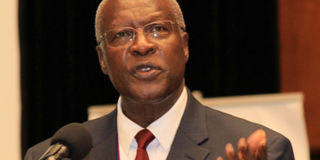Ugandans will suffer for ban on judges, CJ warns

Chief Justice Bart Katureebe speaks at the 21st Judges Conference at Kampala Serena Hotel on Monday. PHOTO BY RACHEL MABALA
Kampala- The citizens will pay the ultimate price of the ban on recruitment of more judges, which was announced by President Museveni on Monday, Chief Justice Bart Katureebe has warned.
During the annual Judges Conference on Monday, the President flatly rejected a call by the Chief Justice for recruitment of new judges for the High Court and other courts to enable the Judiciary manage the staggering case backlog across the country.
President Museveni told the judges to learn how to operate with inadequate manpower.
In response to the President’s decision, Justice Katureebe yesterday said his judicial officers will only do what is humanly possible with the available manpower and resources but warned that the public will suffer the consequences.
“The consequences of the recruitment ban on more judges will entirely affect the people who are the consumers of justice. Given the circumstances, we shall work within our means,” he said in an interview.
“It’s Parliament that passed the resolution to have the number of High Court judges increased to 82, so the same Parliament should now follow it up for implementation,” he added.
Rejecting the Chief Justice’s proposal on Monday, the President instead advised that government would rather pay the few serving judicial officers better than recruit new numbers.
“So if you don’t have, what are going to do? If you don’t prioritise at the strategic level, you will fail because you don’t have enough resources.
Therefore, rather than insisting on more numbers when you are not able to manage them, I would rather concentrate on remunerating the ones we have and then see how to manage other shortages,” Mr Museveni told the judges.
The Judiciary case census report of 2015 shows a staggering backlog of 37,827 cases. A case qualifies to be backlog when it stays two years and above in the judicial system without being concluded and judgment passed.
Judges to scale down performance
Sources within the Judiciary told this newspaper that the judges are upset by the President’s ban and are considering a go-slow strike in performance.
Shortly after Mr Museveni’s speech, the jurists went into a closed-door meeting and vowed to scale down on their work.
“The mood in the closed-door meeting was very low among the judges. It was all about lamenting and lamenting. The judges were of the view that they scale down on judicial work since no one cares about them,” said a source privy to the discussions of the closed-door meeting.
“So who will be hearing the cases in the newly created 135 magisterial areas? We shall hear cases that we can manage but they should not expect us to perform miracles,” the source quoted one of the judges as saying.
The source further said the judges lamented the continuous cuts on the Judiciary budget and government’s failure to increase their salaries despite the commitment announced two years ago.
Judges warn
During one of the plenary sessions at the ongoing conference, the head of the Criminal Division of the High Court, Justice Wilson Kwesiga, said since there is a recruitment ban on judicial officers, there should be no demands for swift delivery of justice.
“If you don’t recruit more judges, then you don’t have the right to demand quick disposal of cases,” Justice Kwesiga warned.
Similarly, Mr Godfrey Kaweesa, the president of Uganda Judicial Officers Association (UJOA), an umbrella body for judges and magistrates, warned that following the recruitment ban, it will take about 30 years for the current number of judicial officers to clear the existing case backlog.
“The recruitment ban is unfortunate as it will take a long time - about 30 years - for us to clear the existing case backlog and at the same time praying that no new cases are filed within those 30 years, a scenario which is practically impossible,” Mr Kaweesa stated.
Judiciary staffing gaps
Court of Appeal. The Chief Justice, in a speech delivered at the conference on Monday, said there are only 11 justices at the Court of Appeal to handle a workload of more than 7,000 cases.
High Court. At the High Court, he revealed there are 52 judges of the approved 82 to handle more than 63,143 pending cases.
This, he said, implies that the workload per judge stands at 1,214 cases, requiring a disposal of 101 cases per month and five cases per day for 22 working days in a month, which he said is humanly impossible.
Magistrate’s Court. At a magisterial level, the head of the Judiciary said they have only 44 chief magistrates of the required 100 to serve all the gazetted chief magistrate’s courts. This, Justice Katureebe said, leaves a deficit of 56 chief magistrates.
Pending cases. The Chief Magistrate added that the number of pending cases at the Chief Magistrate’s level stands at 66,885, implying that the workload per chief magistrate is 1,520 cases per annum, requiring a disposal of 127 cases per month per chief magistrate and six cases per day.
Case disposal rate. On average, it takes at least five years for a criminal case of capital nature to be disposed of.




